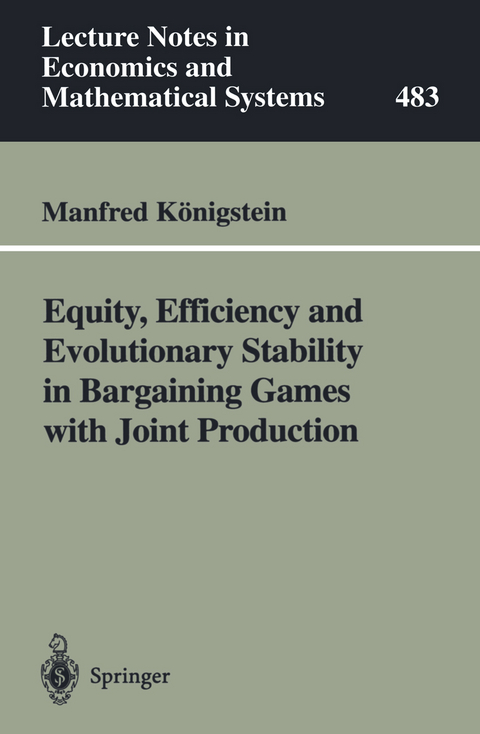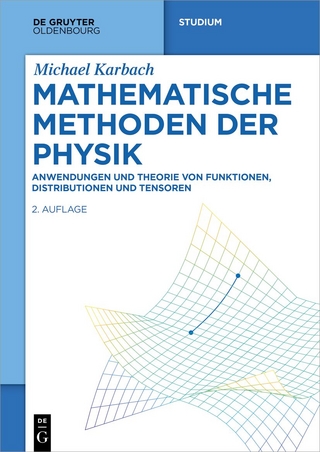
Equity, Efficiency and Evolutionary Stability in Bargaining Games with Joint Production
Springer Berlin (Verlag)
978-3-540-66955-5 (ISBN)
Result 1.10 Simple equity standards were superior to more complex ones, even though the latter might be economically more relevant. Result 1.11 Equity based on quantity (input) and return (output) was most successful and received a hit rate of almost i within a range of 10%, i.e., within a distance of ±5% of the predicted share. Result 1.12 A substantial share of observations is consistent with egalitarian considerations. 1.7 Summary The study investigates the predictive power of equity theory and strategic concepts within ultimatum bargaining with advance produc tion. This is different from many other experimental studies on non cooperative bargaining games, since usually the ressource to be dis tributed between the subjects is given by the experimenter. Here, the "pie" is produced via joint production effort. This scenario is more general than bargaining without production, and we think it is more natural as well. The description of the raw data showed that the production choices are considerably dispersed, but nevertheless systematically biased to ward the respective player's efficient production level. The distribu tions of demanded return shares and demanded surplus shares partly replicated findings of other studies; namely, a low percentage of high demands and a considerable proportion of equal surplus splits. But, they also indicate that "advance production" compared to "no pro duction" should be considered an important treatment in studies on ultimatum bargaining.
An Overview.- 1. Profit Sharing in an Asymmetric Bargaining Game.- 1.1 Introduction.- 1.2 Ultimatum Bargaining with Advance Production.- 1.3 Experimental Procedures.- 1.4 Description of the Decision Data.- 1.5 Aggregate Demand Behavior.- 1.6 Individual Demand Behavior.- 1.7 Summary.- 2. Measuring Treatment-Effects in Experimental Cross-Sectional Time Series.- 2.1 Introduction.- 2.2 Experimental Data, Repeated Measurement and Strategic Interaction.- 2.3 Fixed Effects, Identifying Restrictions and Interpretation.- 2.4 Estimation Procedures.- 2.5 Summary.- 3. Convergence to Equitable Play in the Repeated Ultimatum Game with Advance Production.- 3.1 Introduction.- 3.2 Repeated Bargaining with Advance Production.- 3.3 Theoretical Analysis.- 3.4 Experimental Procedures.- 3.5 Considerations of Experimental Design.- 3.6 Descriptive Statistics of Base Game Decisions.- 3.7 Explanatory Power of Single Predictors.- 3.8 Joint Predictions and Convergence to Equitable Play.- 3.9 Summary.- 4. Equity Anchoring in Simple Bargaining Games with Production.- 4.1 Introduction.- 4.2 Bargaining with Advance Production.- 4.3 Experimental Procedures.- 4.4 Empirical Distributions of Production and Bargaining Decisions.- 4.5 Explaining Aggregate Behavior by a Single Equity Standard.- 4.6 Equity Anchoring and the Tactical Bargaining Margin.- 4.7 Summary.- 5. Efficiency and Evolution of Social Preferences and Prosocial behavior.- 5.1 Introduction.- 5.2 Ultimatum Bargaining with Subsequent Social Production.- 5.3 Game Theoretic Solution.- 5.4 The Indirect Evolutionary Game.- 5.5 Solution of the Indirect Evolutionary Game.- 5.6 Summary.- A. Experimental Instructions Chapter 1.- B. Experimental Instructions Chapter 3.- C. Experimental Instructions Chapter 4.- D. Mathematical Supplement To Chapter 5.- D.2 Mutations ? < ? are Non-Improving if Candidate ? Supports Efficiency.- D.3 Technology 2. a.- D.4 Technology 2. b.- D.5 Technology 2.C.1.- D.6 Technology 2.C.2.- D.7 Technology 2. d.- References.
| Erscheint lt. Verlag | 6.3.2000 |
|---|---|
| Reihe/Serie | Lecture Notes in Economics and Mathematical Systems |
| Zusatzinfo | XII, 197 p. |
| Verlagsort | Berlin |
| Sprache | englisch |
| Maße | 155 x 235 mm |
| Gewicht | 290 g |
| Themenwelt | Mathematik / Informatik ► Mathematik ► Angewandte Mathematik |
| Wirtschaft ► Allgemeines / Lexika | |
| Wirtschaft ► Volkswirtschaftslehre ► Ökonometrie | |
| Schlagworte | Bargaining • Evolutionäre Spieltheorie • evolutionary game theory • Experimental economics • Experimentelle Wirtschaftsforschung • Game Theory • Kuppelproduktion • Spieltheorie (mathemat.) • Statistica • Verhandlung • Verhandlung (wirtsch.) • Verhandlung (Wirtschaft) |
| ISBN-10 | 3-540-66955-8 / 3540669558 |
| ISBN-13 | 978-3-540-66955-5 / 9783540669555 |
| Zustand | Neuware |
| Haben Sie eine Frage zum Produkt? |
aus dem Bereich


